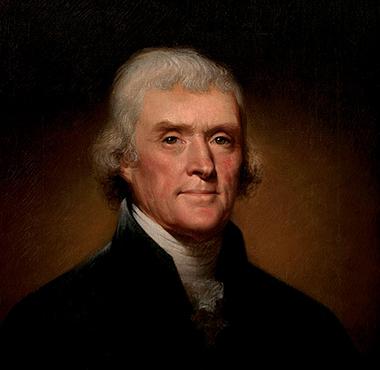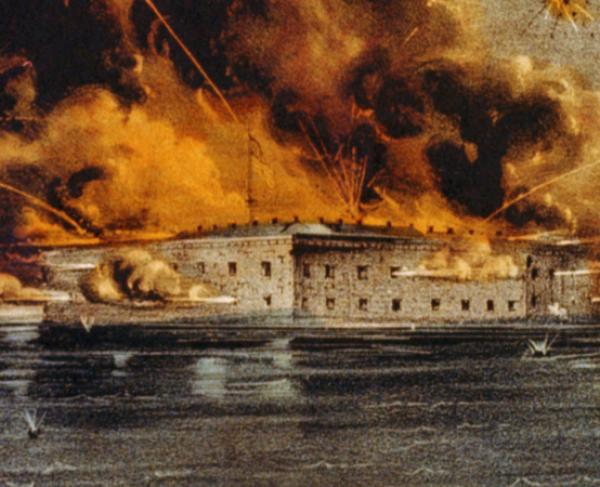The Jeffersonian Party

Opposition to a strong centralized government and the Revolutionary ideals of 1776 continued up to the signing of the Constitution and even further. Even at the signing of the Constitution, George Mason stated that he “would sooner chop off his right hand than put it to the Constitution as it now stands.” Patrick Henry, the man who famously exclaimed “Give me liberty, or give me death!” was also against the Constitution. These sentiments spawned as a result of the Revolutionary War. The Thirteen Colonies gained independence from a powerful centralized government and worried about a president acting like a king. These “Anti-Federalists” wanted a safeguard for personal liberty and freedom from possible tyranny. Thus, James Madison authored the first draft of the Bill of Rights, which aimed to protect individual liberty and freedom from a large centralized government. The Bill of Rights gave the Anti-Federalists something to rally behind and organize. Thus, the opposition group organized around the ideals of Thomas Jefferson and James Madison and formed the Jeffersonian Party. This political party was additionally known as the “Democratic-Republicans” or “The Republican Party” due to their focus on Republican Democracy and individual liberties.

Whereas the Federalist Party feared the continued spread of revolutionary ideals and anarchy, the Jeffersonians welcomed the promotion of revolutionary values. The Jeffersonians opposed the Federalists, who they thought to be aristocratic, wealthy, and elite, despite many Jeffersonians owning large tobacco plantations throughout the South. The Jeffersonians attracted a wide base of support among rural Americans and farmers, which was most Americans.
The Jeffersonian Party began to fall apart after the War of 1812. As, the war was incredibly unpopular among Federalists and even factions of the Jeffersonian Party. However, the weakness of the Federalist Party after the war proved to be too great, which made the Jeffersonians the only party in power. But distinct ideas were adopted by certain members of the Jeffersonian Party as a result of them being the only political party. The factions that formed eventually fractured the Jeffersonians and created new political values and future political parties. The official end of the Jeffersonian Party came in 1824, when four candidates for president were all registered under the “Democratic Republican” party. Thus, each candidate spawned their own political parties, each influenced by the Jeffersonian Party yet different enough to have sparked a larger change in the political climate.
DOMESTIC POLICIES:
The Jeffersonians feared the strong centralized power for which the Federalist Party advocated. As an opposition party, the Jeffersonians valued the rights of the individual states and argued that many federal policies violated the 10th Amendment. Jeffersonians held the Constitution and Bill of Rights in high regard, and strictly followed and applied the documents to each individual situation. Furthermore, the Jeffersonian Party advocated on behalf of the “American Yeoman” (a farmer who only produces enough to feed their family) as Jeffersonians believed that this class was the ideal American citizen. Therefore, the Jeffersonian Party believed that every man had the right to work their own land for their own families. This right was sacred to Jeffersonians, who saw any attempt by any entity to prevent this right, governmental or not, as not-American.
Additionally, in reaction to the Alien and Sedition Acts passed by the Federalist Party, the Jeffersonian Party passed the Kentucky and Virginia Resolutions. The acts targeted Jeffersonians and their supporters by targeting and threatening to jail, fine, or deport any foreign national who spoke or published anything contrary to the ideals of the government, which was under Federalist control. As a result, these resolutions, passed in Kentucky and Virginia state legislatures, declared that the federal government acted in an unconstitutional manner. Therefore, the law was null which allowed individual states to reject it. Additionally, the Jeffersonian Party argued that the Sedition Act violated the freedom of speech and violated ‘the will of the people’.
Furthermore, Jeffersonians were innately skeptical at the government’s ability to protect individual freedoms. Members of this party called upon the citizenry to openly act as a ‘check’ on the national government. Thomas Jefferson, specifically, believed one of these ‘checks’ to be voting. Thus, Jefferson and his party advocated voting to the masses and invented new ways of increasing voter mobilization which increased turnout. Additionally, Jeffersonians saw the Federalists as corrupt and called on the American people to resist corruption of the government by any means necessary as part of their duty as American citizens. The possibility of corruption worried the Jeffersonians so much that the party objected to a national religion and wanted increased separation between church and state in order to prevent governmental manipulation in religion.
ECONOMIC POLICIES:
The Jeffersonians, due to their moral convictions and their advocacy for the Yeoman Farmer, heavily promoted the lifestyles and economy that an agrarian society had to offer. Thomas Jefferson, specifically, thought of cities and other urban areas as “cesspools of filth and corruption” and must be avoided by the average American. Moreover, the Jeffersonian Party sent a message disapproving the wealthy urban elites by proposed taxation legislation which would tax wealthy ‘aristocrats’ while the average farmer was exempted from the taxes. This taxation plan protected farmers from taxes as they produced agricultural commodities that the US collected and sold the surplus internationally, this proved their worth to the US government whereas the aristocrats had nothing to show for and needed to be taxed. The international sale of agricultural goods, theoretically, produced enough revenue that purchased manufacturing tools and equipment to be invested back into the agricultural sector so that more farmed goods could be sold. Thus, a cycle was created between international markets and American farmers, which, ideally, established more occurrences of agricultural surplus due to the increased imports of European farming and manufacturing equipment. The Jeffersonian Party hoped for the US to become the world’s grain supplier. This prevented economic reliance on European powers, which the Jeffersonians fought against.
In order to promote the expansion of the agricultural sector, Thomas Jefferson purchased the Louisiana Territory from France. The territory, which totaled 828,000 square miles of land which stretched from New Orleans and the Gulf of Mexico to Montana, increased the total amount of cultivatable land for the Yeomen to take advantage of. Additionally, the purchase incentivized many farming families to move from the crowded eastern US, which started to run out of land to accommodate the growing population.
Furthermore, the Jeffersonian Party fought for a highly protective economic system to safeguard the agrarian society. This included high tariffs on imported goods because wealthy elites purchased most of the foreign imported goods. Jeffersonians argued that the taxation of imports created enough revenue to safeguard the exports of agrarian commodities along international shipping lanes.
FOREIGN POLICIES:
The Federalists used the term “Republican” or “Democratic-Republican” to describe the Jeffersonians. The term, used in a derogatory way, was meant to equate the opposition to Federalist law and order to the anarchy that occurred during the French Revolution in the established First French Republic. However, there was truth to this statement, as the Jeffersonians aligned themselves with the French Revolutionaries and believed their revolution to be equal to the American Revolution against the British. When the Federalists worked to improve relations with Britain, the Jeffersonians united in their opposition to the United Kingdom. As Revolutionary France formed the French First Republic, the French declared war with Britain. The declaration of war between France and Britain prompted the US government to become divided over their support between the two warring states. While the Federalists held power in the White House, legislation was enacted that outwardly supported the British cause. For instance, the Jay Treaty, which resolved disputes that still lingered after the end of the Revolutionary War and the Treaty of Paris, outraged the Jeffersonian Party which desired to begin a trade embargo with Britain due to their transgressions. The Jay Treaty, negotiated by the Federalists, opened stronger trade relationships between the US and Britain which publicly offended France. The Jeffersonians, however, still resented the British for the impressment of American sailors and saw the British Empire as the greatest threat to their infant nation.
Although tensions between the Jeffersonian Party and Britain were high, the Jeffersonians avoided war and favored the use of economic weaponry like trade embargos. Furthermore, the Jeffersonians were not ready for any type of war, as they saw a standing army as a tool of the national government that suppressed liberty. The Jeffersonians believed that local militias had the ability to combat any local threat and were to be used in an exclusively protective stance. Additionally, the US Navy was confined to small gunboats and fortified artillery batteries along the coast which furthered the Jeffersonian idea of national defense. Eventually, Federalist appeasement of the British went too far and Democratic-Republicans became the party in power come 1812. By this time, the Jeffersonian ideas of American liberty and freedom came under attack from the British once again. Thus, President James Madison, a Jeffersonian, declared war on Britain and began the controversial War of 1812.
Further Reading:
- Jefferson: Architect of American Liberty By: John B. Boles
- Founding Brothers: The Revolutionary Generation By: Joseph J. Ellis
- The Rise of American Democracy: Jefferson to Lincoln By: Sean Willentz

